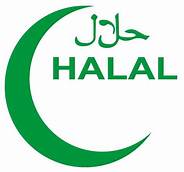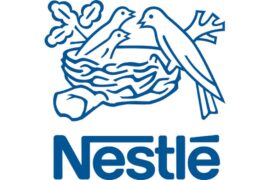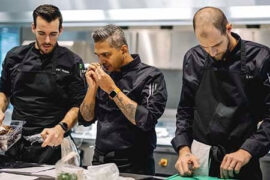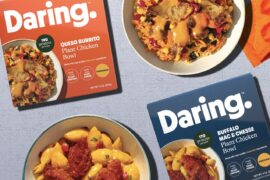Halal products have always been in demand from the world’s Muslim population, but greater understanding of the dietary requirements of followers of Islam has become more widespread among industrial food producers and suppliers as well as retail and foodservice operators. This has led to an influx of new frozen halal products on the market.
 Discussing trends in the segment, Socrates Camenon, managing director of Golden Delight Foods in Birmingham, England, commented: “There has been more of a push in the last seven or eight years for a non-stun halal. There was always a demand, but when the Halal Monitoring Committee (HMC) was founded that created a more secure form of halal – they have an audit trail system from abattoir and processing through to retail.”
Discussing trends in the segment, Socrates Camenon, managing director of Golden Delight Foods in Birmingham, England, commented: “There has been more of a push in the last seven or eight years for a non-stun halal. There was always a demand, but when the Halal Monitoring Committee (HMC) was founded that created a more secure form of halal – they have an audit trail system from abattoir and processing through to retail.”
Although there is clear demand for non-stunned halal meat, in the United Kingdom 84% of halal meat comes from animals that have been stunned before slaughter and certified halal. This shows stunning and slaughter for religious purposes isn’t mutually exclusive.
Business is booming for the sector, with Statistica.com valuing the global halal market at US$ 45.3 billion in 2016 and forecasting its growth to $58.3 billion by 2020. This significant increase projection was based on the fact the Muslim community made up around 23.4% of the total population worldwide in 2010 and is expected to increase to 26.4%, or 2.2 billion persons, by 2030, according to the Pew Research Center. In fact, Muslims were the only religious group that is predicted to grow faster than the global population as whole.
Halal Food Storage
One company noting the rise of halal product consumption in Europe more than a decade ago, and realizing the potential it offered the marketplace, was cold storage warehouse operator Eurofrigo BV, a subsidiary of the Tokyo, Japan-headquartered Nichirei Logistics Group operating five facilities in the Netherlands.
Dirk van Mackelenbergh, who was managing director at the time and is now Eurofrigo’s senior advisor, explained: “In 2006 we experienced a dip in occupancy and therefore had extra space available. The Port of Rotterdam, where we are based, did not have halal facilities for imports. We saw this as an interesting opportunity and within a couple of months we were halal certified. We have seen an increase in halal products produced and it was a benefit for suppliers that we were certified.”
The leading importers of halal foods among Organization of Islamic Cooperation (OIC) countries in 2015 put Saudi Arabia at the top with an import value of $21.54 billion. Malaysia came in second with $14.96 billion worth of halal food imports. In 2016 OIC countries imported around 50% of their vegetables, 32% of processed food products and 18.5% of animal products.
Global cuisines are now more fluid than ever before and therefore more accessible to consumers both in and out of home, and this is being reflected in halal food products.
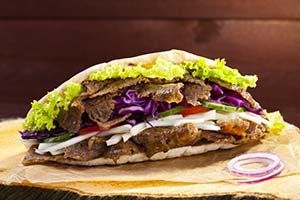 Golden Delight Foods, which in addition to supplying customers in Britain serves clients in continental Europe, Cyprus, Dubai and Morocco, began trading back in the 1990s with just doner on its halal product list. Back then it was a relatively new product, but now is commonplace in fast food outlets the length and breadth of the United Kingdom.
Golden Delight Foods, which in addition to supplying customers in Britain serves clients in continental Europe, Cyprus, Dubai and Morocco, began trading back in the 1990s with just doner on its halal product list. Back then it was a relatively new product, but now is commonplace in fast food outlets the length and breadth of the United Kingdom.
Today, the doner is still a huge part of the company’s business, which specializes in whole cut meats rather than MRMs, but this is just one in a whole range of offerings including marinated chicken, pizza toppings, steak canadian slices (sandwich steaks), peri peri and chicken rashers.
“The best seller is our chicken,” said Camenon. “We have seen huge growth in the peri peri industry thanks to major franchises that have branched off from the likes of Nandos, Pepe’s and Big John’s.”
East Meets West
Landgraaf, Netherlands-based Heuschen & Schrouff Oriental Foods Trading BV has seized the opportunity that increased demand for halal food has presented by expanding its product portfolio.
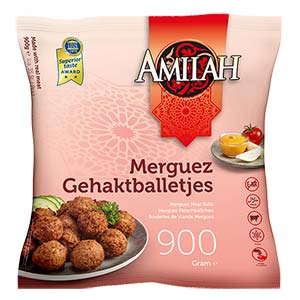 Already offering halal Asian, Arab, Turkish, African and Caribbean cuisines, the company has seen rising interest in Western-style halal foods and has introduced the Amilah brand, which offers a range of foods for Muslim communities to enjoy free of concern.
Already offering halal Asian, Arab, Turkish, African and Caribbean cuisines, the company has seen rising interest in Western-style halal foods and has introduced the Amilah brand, which offers a range of foods for Muslim communities to enjoy free of concern.
The frozen meat snack range contains no mechanically separated meat. Offerings include Amilah Merguez meatballs, chicken wings, lamb burgers, falafel, beef burgers cevapcici and chicken nuggets.
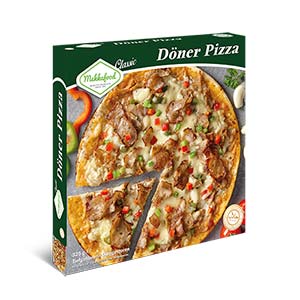 In addition to Classic Cevapcici and Döner Pizza, Mekkafood, based near the Netherlands-Germany border in Venlo, provides a wide assortment of halal food products in a variety of ethnic cuisine traditions ranging from Dutch to Mediterranean. Among items featured are Dutch specialties including frikandellen, kroketten and bitterballen. In fact, its bitterballen was declared “Best Introduction of 2017.”
In addition to Classic Cevapcici and Döner Pizza, Mekkafood, based near the Netherlands-Germany border in Venlo, provides a wide assortment of halal food products in a variety of ethnic cuisine traditions ranging from Dutch to Mediterranean. Among items featured are Dutch specialties including frikandellen, kroketten and bitterballen. In fact, its bitterballen was declared “Best Introduction of 2017.”
All specialities are prepared with care to ensure ingredients are strictly halal – from meat and sauces to herbs and cheeses. The collaboration with two independent halal certifiers means that consumers can enjoy these products with confidence.
Diverse Range
Middlesex, England-based halal food supplier Tahira Foods Ltd’s products can be found in leading supermarket chains in the United Kingdom (including Asda, Co-Op, Morrisons, Sainsbury’s and Tesco), and over 4,500 local convenience, specialist and ethnic retailers across the EU.
Its distribution infrastructure comprises depots, coldstores and a fleet of delivery vans in the UK (London and Manchester), France (Paris, Lille and Lyon), Germany (Hamburg, Stuttgart, Berlin and Siegburg), the Netherlands (Breukelen) and Sweden (Malmo). Tahira products are also distributed through independent wholesalers in Denmark, Italy, Spain, Ireland and Austria.
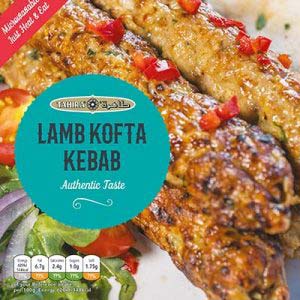 The company’s range includes frozen, fresh and ambient beef, lamb and chicken-based products. The latest frozen dishes include Lamb Kofta Kebab, Chicken Seekh Kebab and Spicy Chicken Franks.
The company’s range includes frozen, fresh and ambient beef, lamb and chicken-based products. The latest frozen dishes include Lamb Kofta Kebab, Chicken Seekh Kebab and Spicy Chicken Franks.
Changes in population, migration and Internet penetration are all reasons for increased global awareness and demand for halal products. The fact that the Muslim population expanded by 18% in the last decade compared to a global increase of 11% is evidence of the world’s ever-increasing appetite for halal food.
With the Muslim population set to grow faster than any other group, it’s clear that demand for halal products will follow suit. Therefore this is a burgeoning market in which more members of the foodservice and retail industries would do well to be a part of. – Reported by Sarah Welsh

